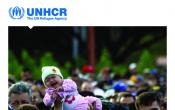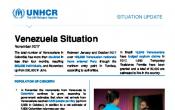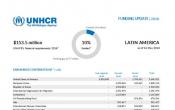Brazil
Operation: Brazil
Location
{"longitude":-51,"latitude":-12,"zoom_level":4,"iso_codes":"'BRA'"}
By clicking on the icons on the map, additional information is displayed.
Key Figures
| 2017 year-end results | |
| 95% | of people of concern have access to work opportunities with the proper documentation required by Brazilian law and job agencies |
| 80% | of the RSD procedures met the minimum standards advocated by UNHCR, an increase from 67% in 2016 |
| 70% | of people of concern were referred to competent institutions to initiate RSD procedures by border authorities |
| 70% | of reception condition met UNHCR’s minimum standards |
| 80% | of status determination procedures will meet UNHCR’s minimum procedural standards |
| 1,800 | people of concern registered for job placement services |
| 2018 planning figures | |
| 100% | of children of concern will have access to national child protection and social services |
| 100% | of increase in resettlement places offered by Brazil |
| 100% | of advocacy interventions for access to national legal services will be carried out |
| 90% | of people of concern will have access to formal work opportunities |
| 80% | of status determination procedures will meet UNHCR’s minimum procedural standards |
Latest Updates
People of Concern
90%
Increase in
2016
2016
| 2016 | 68,087 |
| 2015 | 35,790 |
| 2014 | 47,946 |

[["Refugees",9689],["Asylum-seekers",35464],["Stateless",4],["Others of concern",22930]]
Loading ...
Brazil
< Back
2017
{"categories":[2013,2014,2015,2016,2017,2018],"budget":[5.12118575,8.19637972,7.098857403,6.23346253,5.860249463,13.44778004],"expenditure":[2.63326259,2.73418992,2.83442588,2.7706671,4.47202941,null]}
{"categories":[2013,2014,2015,2016,2017,2018],"p1":[4.91231784,8.08073631,6.913140803,5.99089301,5.670374963,13.34878852],"p2":[0.20886791,0.11564341,0.1857166,0.24256952,0.1898745,0.09899152],"p3":[null,null,null,null,null,null],"p4":[null,null,null,null,null,null]}
{"categories":[2013,2014,2015,2016,2017,2018],"p1":[2.52868194,2.69922657,2.76896319,2.65545223,4.33812641,null],"p2":[0.10458065,0.03496335,0.06546269,0.11521487,0.133903,null],"p3":[null,null,null,null,null,null],"p4":[null,null,null,null,null,null]}
Loading ...
CHOOSE A YEAR
- 2015
- 2016
- 2017
- 2018
Operational context
In 2017, corruption scandals continued to destabilize the government and deepened the political crisis in the country. This political instability created uncertainty on the level of engagement of the authorities on refugee issues and brought constant changes in key government positions, which posed challenges to the coordination and governance of the National Committee for Refugees (CONARE) and other governmental bodies.A major milestone was the sanctioning of the new Migration Law, which came into force in November 2017 and included provisions on eradication of statelessness and the possibility to expedite access to naturalization for those recognized as stateless. The new law consolidates the non-refoulement principle and introduces alternative migratory pathways, which will potentially reduce the burden on the asylum system, while providing the establishment of complementary humanitarian protection.
UNHCR strengthened its presence in the northern States to respond to the needs of the Venezuelan asylum-seekers arriving in the country. UNHCR has engaged with different counterparts to improve preparedness and to strengthen response capacity to this new situation. National government authorities have reassured that Brazilian borders will remain open for Venezuelan citizens, with the provision of protection, assistance and basic services. The continuous influx of Venezuelan asylum-seekers into Brazil affected host communities, hampering the provision of public services and triggering tensions between asylum-seekers and the local populations.
Population trends
According to CONARE and the Federal Police, close to 33,900 new asylum claims were registered in Brazil in 2017. The top five countries of origin were Venezuela (some 17,870), Cuba (some 2,370), Angola (some 2,360), Haiti (some 2,040) and China (some 1,460). The refugee status determination (RSD) backlog stood at some 86,000 pending applications against to 10,150 recognized refugees by years’ end.Brazil continued to witness a sharp increase in the number of asylum applications submitted by Venezuelan nationals. According to the Federal Police, more than 22,200 Venezuelans have applied for asylum in Brazil since 2015 By the end of 2017, some 8,450 Venezuelans received two-year temporary residences under the National Council for Immigration’s normative resolution 126/2017. The number of undocumented Venezuelans is estimated to stand between 20,000 and 30,000.
Due to lack of an adequate stateless status determination (SSD) procedure, there is not yet official data under CONARE on stateless persons in Brazil. The Federal Police has internally registered a considerable number of stateless persons and it is expected that once an SSD procedure is in place, the numbers will be harmonized.
Key achievements
- UNHCR provided technical support to the Government for the planning, designing and implementation of a preparedness and emergency response plan for the influx of Venezuelans in Roraima and Amazonas states. Field Units opened in Boa Vista and Manaus, working with UN agencies, civil society and local governments.
- UNHCR supported activities in border and profile monitoring, registration, shelter, case management, income generation activities and cash-based interventions.
- Technical support and capacity building provided to CONARE to address quality asylum initiative (QAI) programme recommendations. Focus of the strategy continued to be the strengthening of the RSD system, aiming at a fair and efficient system that could cope with the growing intake and with the challenges of mixed migration flow in the country.
- Successful advocacy efforts by UNHCR and partners before Brazil’s Supreme Court allowed the access of foreigners (including asylum-seekers and refugees) to a social assistance grant offered to the elderly and those unable to generate income.
- The Sergio Vieira de Mello Academic Consortium was expanded to 19 universities with five new memberships in 2017, offering services and facilitating access to graduation and post-graduation courses to people of concern including some 70 refugees, who are currently enrolled in different courses.
- The second edition of the awarded interagency project Empowering Refugee Women was implemented with UNHCR support. Some 50 women received mentorship on life skills for livelihood purposes and were referred to employment opportunities. Partnerships with private companies resulted in tailored self-reliance projects, entrepreneurship training and access to financial services and banking for asylum-seekers and refugees. In December 2017, the Help.unhcr.org platform went live in Portuguese and Spanish, providing useful information to people of concern.
- In the context of the Venezuela situation response, UNHCR and partners fostered livelihood opportunities to indigenous women, focused on handcrafting.
- The Office supported the Brazilian Public Defenders’ Office (DPU) and the Public Prosecutor’s Office to reach agreements with local authorities in Roraima and Manaus on the access of asylum-seekers and refugees to education – exempting students from presenting translated documents to enroll in public schools – and to establish alternatives for the registration procedures of undocumented indigenous children. Advocacy by UNHCR and partners resulted in CONARE, the National Council for the Rights of Children and Adolescents and DPU adopting a joint resolution focused on the identification and referral of unaccompanied and separated children in need of international protection, ensuring their effective access to documentation.
Unmet needs
- In the context of the Venezuela situation, all shelters are above their reception capacity and require considerable improvements regarding security, water, sanitation and hygiene, provision of health services and specific facilities for children. Due to human resources constraints and a high number of people with specific needs, it was not possible to provide proper follow-up to all cases. Durable solutions for some people of concern living in shelters has yet to be identified, while the government of Brazil is undertaking an internal relocation programme as of April 2018. With the increase of arrivals of Venezuelan asylum-seekers, registration and documentation services are below the requirements. Improved monitoring, presence and capacity at the border with Venezuela should be improved and prioritized as the number of arrivals is rising. There is a need for more shelters in the border states of Roraima and Amazonas, as the number of asylum seekers (including children and women) living in the streets of Boa Vista is growing exponentially, increasing their vulnerabilities in terms of sexual and gender-based violence (SGBV), exploitation and risky behaviors.
- Unstable political scenario and funding shortfall continued to jeopardize the continuity of QAI programme and its main objective of strengthening the RSD system in Brazil. The absence of a live registration and case management system at the Federal level, linking border authorities and CONARE, remained a challenge. The lack of reliable data on SGBV (including proper registration and case management) remains a barrier for developing appropriate response strategies in line with people of concern specific needs. Underreporting was still present, while capacity among partners on SGBV case management remained critical. Lack of safe spaces and a sound outreach strategy has hindered disclosure of SGBV incidents.
- Without a National Plan for Local Integration, the effective achievement of comprehensive, complementary and sustainable solutions for refugees is hindered. There was a need for more professional and entrepreneurship training courses for people of concern nationwide, including advanced Portuguese classes. There are still several bureaucratic barriers to expedite the revalidation of academic diplomas by refugees. Due to budgetary constraints, the value of finance assistance provided to people of concern is not covering their basic needs. Livelihood initiatives involving private companies are mainly limited to the city of São Paulo and need to be expanded to other major cities around the country. The implementation of a sound livelihoods strategy is pending, as the Office could not conduct a comprehensive profile of the entire refugee population in the country due to financial constraints.
Working environment
Brazil is the main recipient of asylum claims in the Southern Cone region; and the country in Latin America receiving most asylum claims from outside the continent, with an unprecedented increase in recent years.Brazil plays a leadership role in the region in finding innovative solutions to protect refugees and displaced people. Brazil has granted permanent residency to some 44,000 Haitian asylum-seekers on humanitarian grounds. São Paulo became the first city in the region to have a public policy framework for the promotion and respect of the rights of refugees and migrants at the municipal level approved by a Municipal Bill.
A new national migration law is about to be adopted which will result in more legal avenues for legal migration to Brazil reducing the pressure on the asylum system. The prevailing political and economic situation in the country makes this a challenging proposition, however.
The increase in the cost of living has affected the situation of people of concern, with persons facing particular difficulties in finding and securing adequate shelter and employment. Local currency fluctuations since January have severely affected programme implementation, and state-driven austerity measures might reduce resources for immigration and refugee programmes, in particular efforts to further socio-economic local integration prospects for refugees.
Despite the Government’s willingness expand resettlement programmes, the implementation of large scale resettlement projects may be affected by resource constraints.
Key priorities
In line with the 2015-2017 Protection and Solutions Strategy for the Southern Cone, UNHCR will support Brazil in the strengthening of its leadership role within the implementation of the Brazil Plan of Action at both national and regional levels.The UNHCR operation will focus on:
• Supporting the institutionalization, professionalization and strengthening of the Comitê Nacional para os Refugiados (CONARE) in a sustainable manner
• Providing technical support to the Government to implement the RSD backlog project resulting in a reduction of 80 % of pending applications and improved quality of asylum.
• Providing technical support for the development and implementation of a National Local Integration Plan, and engage municipalities and the private sector to help generate livelihoods opportunities;
• Strengthening the coordination of relevant government and NGO institutions to facilitate effective access for refugees to solidarity-based public services within current legal frameworks
• Promoting and providing technical support for the implementation of policies on regional mobility including the two Pilot Projects on labor mobility with ILO and Global compact
• Designing policies and programmes at the local level to promote intercultural integration of refugees and host communities
• Enacting Cities of Solidarity agreements with municipalities to exchange good practices and foster municipal ownership.
In view of the prevailing economic situation in the country, with the implementation of the Government’s austerity measures, social programmes and public policies are likely to be adversely affected in 2017. A reduction in the financial requirements of UNHCR programme in Brazil will result in vulnerable new arrivals not being adequately assisted. Due to insufficient investment in local integration, refugees will no longer be able to enrol in language and life skills training, resulting in a much reduced access to the labour market. Given the low degree of engagement of development actors, more refugees will continue to remain dependant on UNHCR and Partner assistance, moving further away from achieving self-reliance and seeing their livelihoods improved. The RSD backlog will continue to increase.


